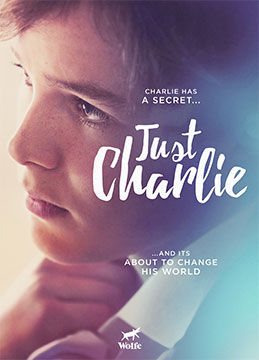
Director: Rebekah Fortune
Running Time: 97 mins
Certificate: NR (US)
Release Date: January 30th 2018 (US)

Young Charlie seems to be living a British teen boy’s dreams when given an opportunity that’s setting them up to play football (soccer) professionally in the future. However, Charlie seems reticent, despite loving football and having a dad, Paul (Scot Williams), who’s extremely keen as his own sporting dreams were dashed when he was younger. Indeed, he’s the football equivalent of a stage mother.
It’s not just typical teen contrariness though, as Charlie is struggling with gender identity issues and reaching the point where she can’t hold it in anymore. As she slowly and steadily begins living more of her life openly as a girl, both she and her family face challenges they never expected. That ranges from the fact Charlie’s father struggles to accept the new reality and starts to blame his daughter for it, to her best friends rejecting her when she transitions at school. There’s also a school that isn’t sure how to handle things and the threat of violence from those who don’t understand.
Just Charlie is a heartfelt film that tries to cover a lot of ground and scenarios for what it’s like for a teen to transition. However, it mainly focuses on the family dynamics as mum, dad, Charlie and her older sister deal with what’s happening in their own way. It doesn’t try and hide the fact that it can be tough for everyone and that even for those wholeheartedly supporting someone through their transition, it can be confusing and sometimes painful.
There are also plenty of trials outside the family, with the movie showing lost friendships, verbal abuse, community ostracism, and the possibility of serious physical assault (or worse). Although these are all very real issues faced by members of the trans community, there are moments when Just Charlie feels like it’s dealing with them in a slightly PSA way, especially when shocking and painful developments are either dealt with at lightning speed or followed with scenes that attempt to trick the audience into believing one thing has happened when actually it’s something else.
Although the way these things are handled can be a little clumsy, the film is anchored by the family, and most particularly an astonishingly open and unselfconscious performance by Harry Gilby as Charlie. He really is brilliant, and it’s perhaps even more impressive that he gives such a mature and cleverly evolving performance in his feature debut. He brings a sense of reality and enormous empathy to the tale, pulling the audience into the pain, confusion and difficulties Charlie is facing, while also ensuring that you feel the highs as well as the lows. Harry is backed by good performances by both Scot Williams as Charlie’s dad, and a raw, heartfelt turn by Patricia Potter as her mother.
The film manages to tread a very fine line, so that while it never hides from the possibility of darkness, it’s ultimately more interested in the light – the possibility of change and redemption, and that with love people can find their way through nearly anything. As the title suggests, irrespective of how others have viewed her, Charlie herself hasn’t changed, she’s always just been Charlie. However, in showing others who she really, the movie takes her on a sincere and sometimes inspiring journey where love and understanding fight against all manner of tribulations.
Overall Verdict: A moving trans family drama featuring an astonishing performance from its young lead and enough heart to ensure its occasional rough edges don’t matter at all.
Reviewer: Tim Isaac
Leave a Reply (if comment does not appear immediately, it may have been held for moderation)